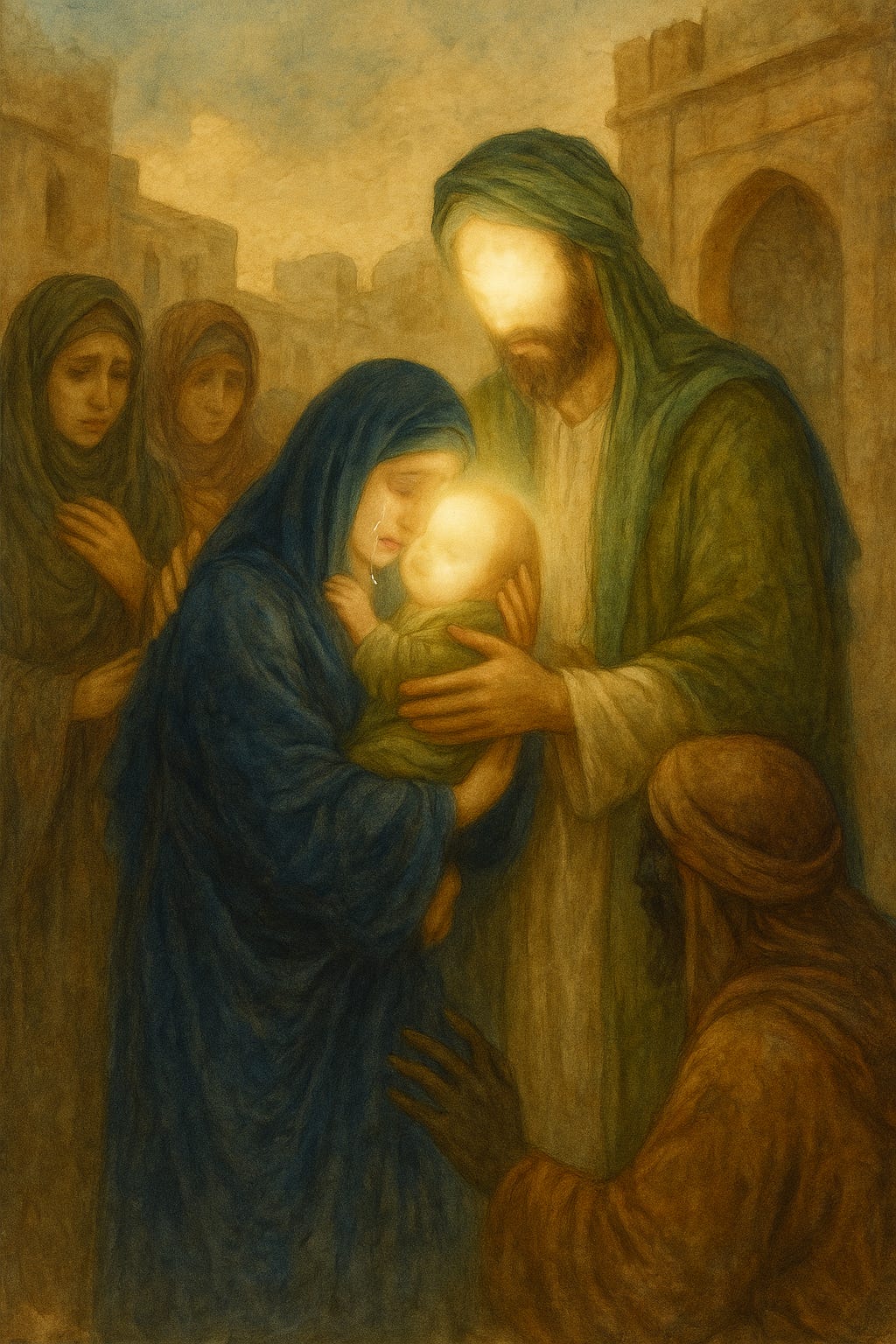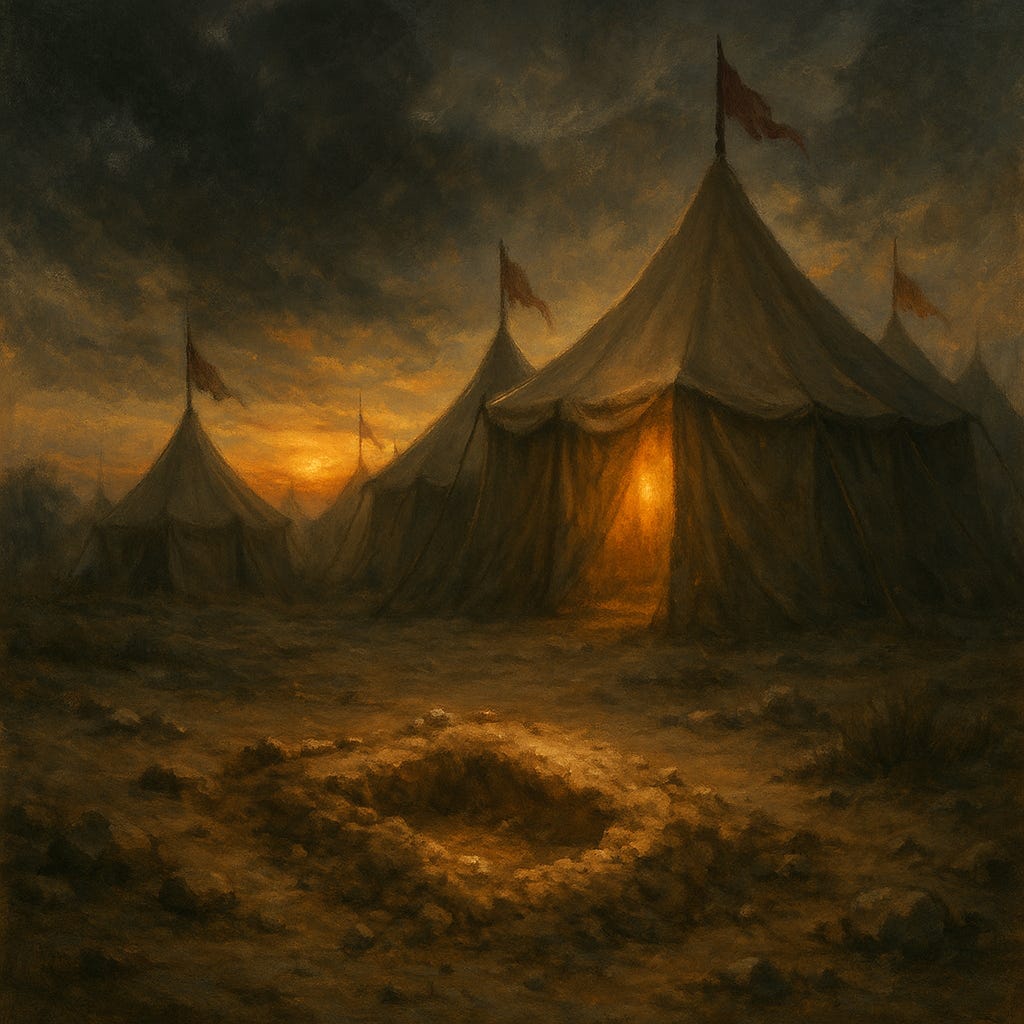[9] Ashura Maqtal - Ali al-Asghar
This is a series of maqatil (martyrdom narratives - devotional recitations recounting the suffering and sacrifice of the Ahl al-Bayt, the family of Prophet Muhammad). These are for Ashura 2025/1447
In His Name, the Most High
بِسْمِ ٱللّٰهِ ٱلرَّحْمٰنِ ٱلرَّحِيمِ
ٱلْحَمْدُ لِلّٰهِ رَبِّ ٱلْعَالَمِينَ وَصَلَّى ٱللّٰهُ عَلَىٰ سَيِّدِنَا مُحَمَّدٍ وَعَلَىٰ أَهْلِ بَيْتِهِ ٱلطَّيِّبِينَ ٱلطَّاهِرِينَ ٱلْمَعْصُومِينَ، أَمَّا بَعْدُ
السَّلَامُ عَلَيْكُمْ وَرَحْمَةُ اللَّهِ وَبَرَكَاتُهُIn the name of God, the Most Gracious, the Most Merciful.
All praise is due to God, the Lord of all worlds, and may blessings be upon our Master Muhammad and upon his pure, purified, and infallible household. As for what follows:
Peace be upon you, and the mercy of God, and His blessings.
Video of the Maqtal (Eulogy)
Audio of the Maqtal (Eulogy)
Ali al-Asghar
The Crime of Child-Killing in History and Scripture
The martyrdom of Abdullah al Razi (popularly known as Ali al Asghar (AS)), is possible one of the most horrific events to occur during the whole epic of Ashura and Karbala.
The crime of child or baby killing is considered particularly abhorrent in the eyes of Allah (SWT) and references have to this crime have been made in the Holy Qur’an. At time of the birth of Prophet Musa (AS), Pharoh wiped out an entire generation of Israelite boys, in order to prevent Musa from being born.
“He (Pharoh) slaughtered their sons and let their women live; surely he was one of the mischief makers”.
—Surah Qasas 28, Verse 4
In another reference we here about the condition of female infants born in pre-Islamic Arabia. It was common practice for father’s to bury their new born baby daughters alive, as they were considered to have no value.
And when the female infant buried alive is asked; For what sin she was killed.
—Surah Tawkir 81, Verses 7 & 8
In the modern era, child killing has become an industry with nearly 10,000,000 abortions occurring globally every year. We see that the brutal Zionist entity has no respect or compassion towards children or babies, with over 20,000 children in the campaign against Gaza, not to mention those they killed in Lebanon, Yemen and recently in the Islamic Republic of Iran. Also the terrorist groups like ISIS (or Daesh) have carried out massacres of thousands of children.
The pure blood of the infant Ali Asghar (AS) is the representation of all of these oppressed and wronged children throughout history.
The Birth and Early Journey of Ali Asghar (AS)
Hazrat Ali Asghar (AS) was born in early Rajab 60 AH and was only a few days old when he left Medina along with his father Imam Hussain (AS), his family members and companions.
His mother was Rabab binte Imru’ al-Qays, who daughter of a prominent Syrian Christian man, who converted to Islam during the time of the second caliph.
The Tears of Fatima Sughra
Before leaving Medina, Fatima Sughra his sister, who was remaining behind due to illness, takes hold of her baby brother and wishes to keep him with her. All of the ladies come to try and separate the little baby from his sister, even the baby’s mother, but he would not leave his sister.
Finally Imam Hussain (AS) came and whispered some words in the ear of the Ali Asghar and he immediately jumped into the arms of his father. What was said is not mentioned, however it is clear that without the sacrifice of Ali Asghar (AS) the mission of Imam Hussain (AS) would not have had the same impact.
Lady Rabab’s Lament and Imam Hussain’s Reassurance
Lady Rabab came to her husband and lamented that the fact that her children were too small and would not be able fight in defence of Islam. Imam Hussain (AS) reassures her and tells her
“No Rabab, Do not fear. Your children will do the greatest jihad and be of the greatest service to Islam”.
The Cry for Help and the Infant’s Response
On the day Ashura, all of the men and youths from the camp of Imam Hussain (AS). Only himself and his son Imam Sajjad (AS), who was too ill to fight. Imam Hussain (AS) goes outside of his tent and lets out a cry
“Is there anyone to help us. Is there anyone who will hear our cries”.
As Imam Hussain (AS) raised his voice, he could hear a commotion coming from inside the tent and sound of a baby crying. Imam Hussain (AS) saw the ladies standing around and weeping inside the tent.
Imam is told that when he raised his cry from outside the tent, his infant son Ali Asghar began to cry and threw himself from his cradle. Ali Asghar had been thirsty for several day and his mother’s breast milk had dried up due to lack of nutrition.
Imam Hussain (AS) tells Rabab to get Ali Asghar ready, so that he can take him in front of the enemy, perhaps they would have some mercy on the small baby.
Dressing the Infant for the Battlefield
Rabab dresses Ali Asghar in his best clothes and beautifies the baby, so that enemies may have some mercy for him.
Imam Hussain (AS) Pleads with the Enemy
Imam Hussain (AS) takes under his cloak and heads towards the battlefield. The enemy forces sees him and believes that he carrying the Qur’an and wishes to make a truce. Imam Hussain (AS) opens his cloaks and holds up the thirsty baby so the enemy army could see him. Addressing the enemies he then says
“If you show no mercy to me; At least have mercy on his thirsty child”.
Then turning towards his thirsty infant son
“O my son Asghar, show these people how thirsty you are”.
As Ali Asghar begins moving his tongue across his lips, the enemies could see the dryness of his mouth.
Hurmala’s Hesitation and the Angelic Intervention
There was a disturbance in the enemy ranks, especially amongst some who had small children. Some of them were heard weeping, others were saying that they should give water to the baby.
Umar Saad feared a potential mutiny in his army and turns to his main archer Hurmala, telling him
“Cut off the tongue of Hussain”.
The Arrow of Death and the Martyrdom of Ali Asghar (AS)
Finally Hurmala reaches into his bag and removes a three headed arrow, the type normally used for hunting large prey such as camels.
Hurmala sees the whiteness coming from the neck of the same baby and takes aim. He sends the arrow high into the sky, when the arrow approaches near to were Imam Hussain (AS) is standing, his baby son leaps forward from his father’s arms, taking a direct hit from the arrow and piercing his neck from ear to ear.
The Earth and Heavens Refuse the Blood
The blood begins gushing forth from the neck of Ali Asghar (AS). Imam Hussain (AS), seeing the blood gushing, tries to direct it towards the sky. He hears a voice from the Heavens
“O Hussain, if one drop of this innocent blood reaches the sky, then there will never be any rain and the earth would become barren”.
Imam Hussain (AS) then tries to direct the blood towards the ground, and he hears a voice
“O Hussain, if one drop of this innocent blood falls on the ground, the earth would become barren and nothing would grow from it.”
Finally he directs the blood of Ali Asghar (AS) towards his face and calls out to his grandfather the Prophet (SAAW),
“O Messenger of Allah, I shall return to you in this condition”.
Returning the Baby to the Tent
Finally Imam Hussain (AS) takes the body of the infant Ali Asghar and begins moving towards the tent.
However he was hesitant to show the condition of the baby to the mother Rabab, so he moved backwards and forwards reciting the following line.
“Verily we are from Allah and unto him shall we return. I am pleased with His decree and submit to His order.”
Rabab’s Lament and the Burial
Imam Hussain (AS) finally enters the tent with the body of Ali Asghar (AS), hidden under his cloak. He lifts the cloak slowly and Rubab sees the body of her slain infant son.
The Desecration After Karbala
A small grave is dug by the side of tent where the body of Ali Asghar is place. However later on the body is exhumed by Shimr, who severs the head and places it on a spear alongside the other martyrs.
Peace be upon the suckling young one.
Peace be upon the bodies that were hung after being killed.
Peace be upon the nearest of the Prophet’s progeny.
Peace be upon the corpses which were abandoned in the desert.
وَسَيَعْلَمُ ٱلَّذِينَ ظَلَمُوا۟ أَىَّ مُنقَلَبٍۢ يَنقَلِبُونَ
And those who have wronged, will come to know to what [evil] return, they will be returning.
- Quran, Surah ash-Shu’ara (the Chapter of the Poets) #26, Verse 227
إِنَّا لِلَّهِ وَإِنَّا إِلَيْهِ رَاجِعُونَ
Indeed, we belong to God, and indeed to Him we shall return.
- Quran, Surah al-Baqarah (the Chapter of the Cow) #2, Verse 156














